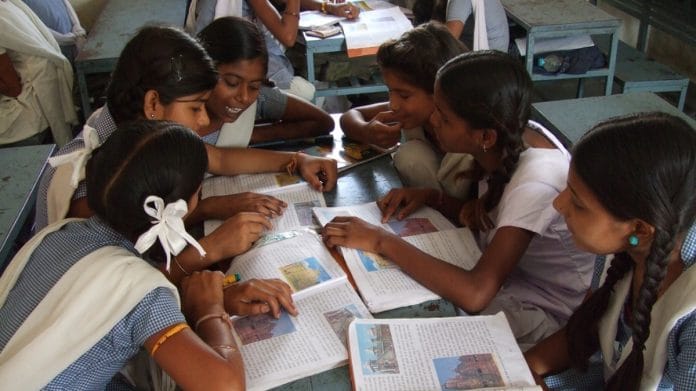New Delhi: Students staying in school hostels should be called in batches to ensure social distancing, needs of marginalised children and kids of migrant workers should be prioritised, and study-from-home must be encouraged until normalcy resumes.
These are among the major highlights of the draft guidelines prepared by the National Council of Educational Research and Training (NCERT) on ‘Reopening of schools in the time of Covid-19 pandemic’, a copy of which was accessed by ThePrint.
With regard to residential schools and those with hostels, the draft said: “Hostellers need to be called in batches (33 per cent students should be called in at one time) in a phase-wise manner. An arrangement of a safe quarantine facility should be made before reopening as hostellers are coming by trains.”
The NCERT also suggested screening before entry in hostels, regular visits of counsellors, adequate measures for health check-ups and arrangements of emergency facilities from nearby health centres.
It also said “parents should be asked whether they still want their child to study from home”.
The NCERT stated that children, who have the facility for online education, may be allowed to study from home until everything gets normal, adding that encouraging study from home would help in maintaining social distancing.
It further said there must be a change in the placement of beds and study tables in hostels to maintain a 6-ft distance between the students.
About new admissions, it said: “While doing admission to new classes, only parents may be consulted. Children should not accompany parents.”
ThePrint had earlier reported schools would reopen in a phased manner. This NCERT draft reiterated it.
Also read: Over 70% parents want schools to reopen only after 21 days of zero Covid cases: Survey
Focus on migrant workers’ kids
The draft raised the issue of children of migrant workers, and those with minimum facilities and support.
“Children whose parents are migrant workers may not have mobile phones. This issue also requires our attention.”
It further said focus must be on the most vulnerable students like homeless/migrated or students with disabilities, and those impacted by Covid due to death in the family because of the disease.
“Their needs should be prioritised,” the NCERT suggested in its draft guidelines.
It further said states would need to ask the schools to trace the children of migrant workers and find out whether they are in a position to come to schools.
School heads also need to plan innovative ways to bridge the gap between students with and without technology, it added.
From classroom to midday meal — social distancing a must
The NCERT draft is divided into six sections and social distancing has been mentioned 61 times in total.
The highlights of the draft guidelines stated they are based on three pillars in this era of Covid-19 — social distancing, health and hygiene, and learning.
Stressing on social distancing, the draft said: “There must be a 6-ft distance between students on all four sides in the classroom.”
In a 500 sq ft classroom, only 10 students and a teacher will be allowed to ensure social distancing. The draft has also suggested a flexible, staggered and reduced timing for different classes.
The 6-ft distance norm has been suggested to be followed even at the entry and exit gates.
Midday meal distribution too will have to follow the norms of social distancing, and specific seating arrangements with chalk-markings should be made for the children.
Social distancing needs to be followed in the kitchen as well, where no one except the cook and a helper will be allowed.
Students will need to maintain social distancing in toilets, drinking water and hand-washing areas, and bus depots too. Enough availability of hand sanitisers and soaps has also been suggested.
There is a fear that children may not be comfortable with social distancing and wearing of masks.
On this, the NCERT suggested: “Their discomfort needs to be emphasised by the teachers and they need to make them convinced to take these precautions through interesting stories.”
The draft also issued suggestions regarding eating habits.
It said children should not be allowed to buy any eatables from outside. Secondary and senior secondary students of government schools should be asked to bring their own food.
In private schools too, it said, students must be advised to bring food from home unless schools ensure safe food supply from their canteens.
Also read: Can schools & students be trusted with Covid norms or should classes begin as curve flattens?






